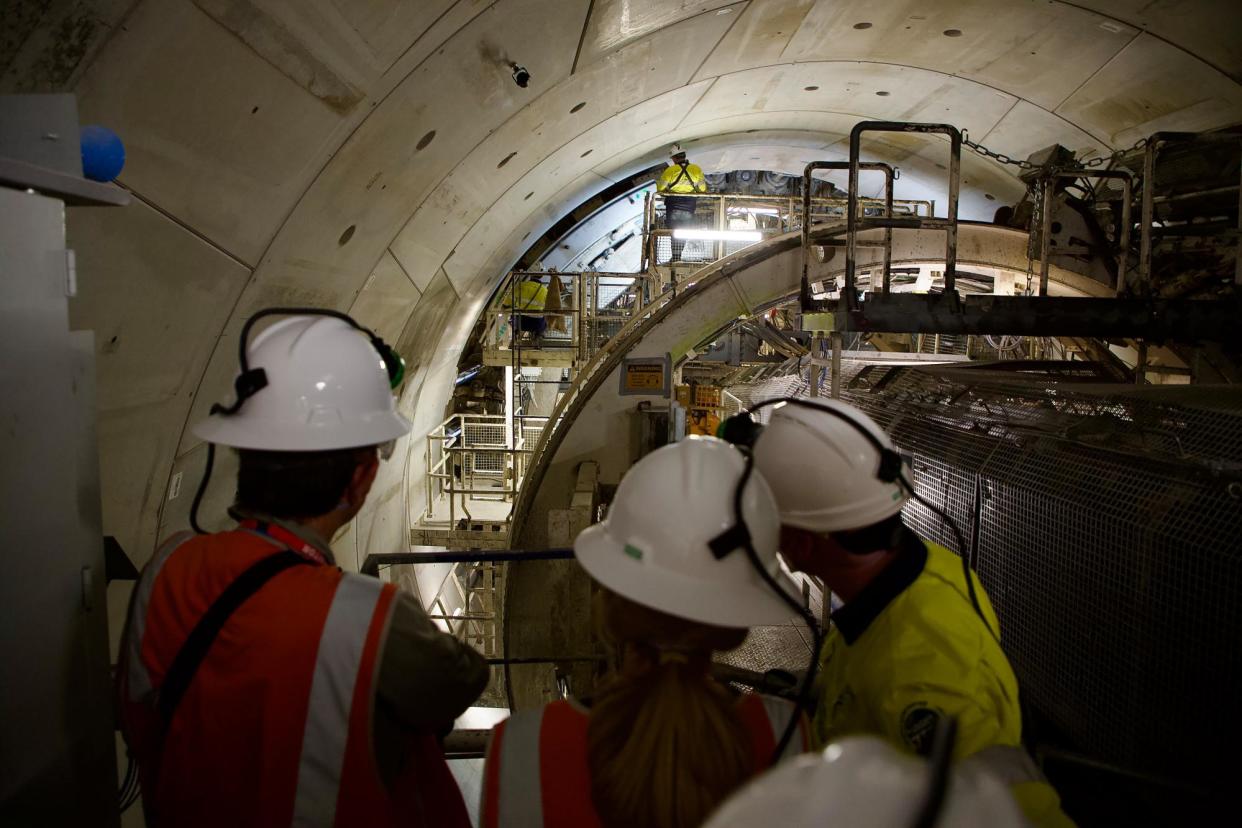Snowy Hydro’s 2.0 fortunes might finally be turning as drilling gets back on track

Each year on 4 December, Snowy Hydro invites a local Catholic priest to bless a small statue at the entrance to the tunnels of its giant 2.0 pumped hydro project to mark Saint Barbara, the patron saint of tunnellers and miners everywhere.
Those working underground are “reasonably superstitious people”, jokes Dennis Barnes, Snowy Hydro’s affable chief executive, as he leads a media tour of a project whose budget had soared sixfold to $12bn and won’t start supplying power to the grid until the end of 2028 or seven years later than original touted.
Related:Snowy Hydro 2.0 eyes return to tunnelling after delays and cost blowouts
Snowy 2.0’s fortunes, though, might finally be turning.
The 2,500-tonne tunnel boring machine dubbed “Florence” ended its year-long stall in soft rock two days after the priestly visit from Father Mark Croker. It’s now picking up pace half a kilometre into a 16km tunnel near the upper dam at Tantangara, deep within the Snowy Mountains.
“Florence not moving was a lightning rod for the project … having its difficulties,” Barnes said at end of Wednesday’s tour. “All of the other work fronts just kept going when Florence was paused.”
Barnes, who took over as Snowy’s boss a year ago, also recast the deal with Italy’s WeBuild, the main contractor, making it “cost-plus” rather than a fixed price. While the move shifted most of the risk to Snowy, it ended the haggling “on every point”.
“We want everybody to be successful,” he said. “We want the contractor to be very successful.” Having WeBuild losing money “just isn’t a great place for anybody”.
While more engineering challenges lie ahead, just over half the construction is complete, with most of the 2,700-odd workers unimpeded by Florence’s woes.
Crews excavating the main power station cavern, about a kilometer underground, say rock conditions couldn’t be better. Six turbines will be installed there to generate 2,200MW for a total of 350GW-hours – enough to power 3m homes for a week.
They can then reverse to pump water from a lower reservoir at Talbingo back up to Tantangara at times when electricity is cheap in a closed loop.
“In addition to providing security of supply and competition, we are very much required to enable the decarbonisation of the electricity system,” Barnes said. By aiding more renewable energy to be added, Snowy 2.0 will help cut carbon emissions in the national electricity market by 19.4m tonnes of CO2-equivalent a year.
Snowy Hydro also pledges to reduce damage to the Kosciuszko national park, including shrinking its footprint to a 10th of its current construction size once the project is completed. Whether the stocky galaxias fish survives, among other endangered species, remains to be seen.
However, for Mark Barrett, a senior engineer working on Florence, “it’s been fantastic” for workers’ morale to have Florence boring again. “It makes such a difference when there’s productivity.”
Florence’s current six metres a day, though, will have to quicken to at least twice that pace if the key headrace tunnel is going to meet Snowy’s revised goal.
About 6km to 7km in, the machine is also expected to hit some natural asbestos, requiring extra safety measures. A bigger problem further on, however, may come about 2.5km from the power station when the tunnel’s path crosses the so-called long plain fault, a zone of fractured ground that runs about 250km from Victoria into New South Wales.
Dave Evans, 2.o’s project director, said while the fault was “nothing like” the soft earth that stalled Florence near Tantangara, geologists anticipate a testing patch of at least 500 metres long.
“We’re going through options right now on de-risking [it],” Evans said.
Those alternatives include Snowy buying a fourth tunnel boring machine (TBM) at the cost of more than $100m, or reverting to drill and blasting techniques.
“I expect the decision we’ll make will mean that we won’t be relying on the TBMs for that zone,” Barnes said.
While engineers have more than two years to resolve the fault zone issue, a more immediate challenge will be drilling the 9.8 metre-diameter tunnel at a 25-degree incline up from the power station towards Tantangara.
Related: Snowy Hydro 2.0 costs blowout confirmed to be almost $13bn
“A tunnel boring machine of this size has never done it before,” Evans said. Kirsten, as the designated machine is dubbed, will be elongated to 210 metres long – or 50% longer than Florence. The concrete segments and grouting will need to withstand as much as five times the usual water pressure.
“The good thing is now is that we’re ahead of risks, so we’re thinking about risks that are upcoming rather than reacting,” Barnes said. “We get more and more confident every day.”
While Snowy 2.0 faces engineering challenges, the project’s financial returns – including delivering a net present value of $3bn more than its costs – depend on it being linked to the grid on time.
Costs of the 500-kilovolt HumeLink, being built by Transgrid – with the tab to be picked up by NSW consumers – may top $5bn. Some landholders oppose construction towers with a height maximum of 76 meters crossing their properties.
“We don’t build the transmission line,” Barnes said. “The most recent advice from Transgrid was that HumeLink would be finished at the end of 2027 and that’s what we expect them to do.”
Time, perhaps, to find a patron saint for transmission builders to have blessed.


